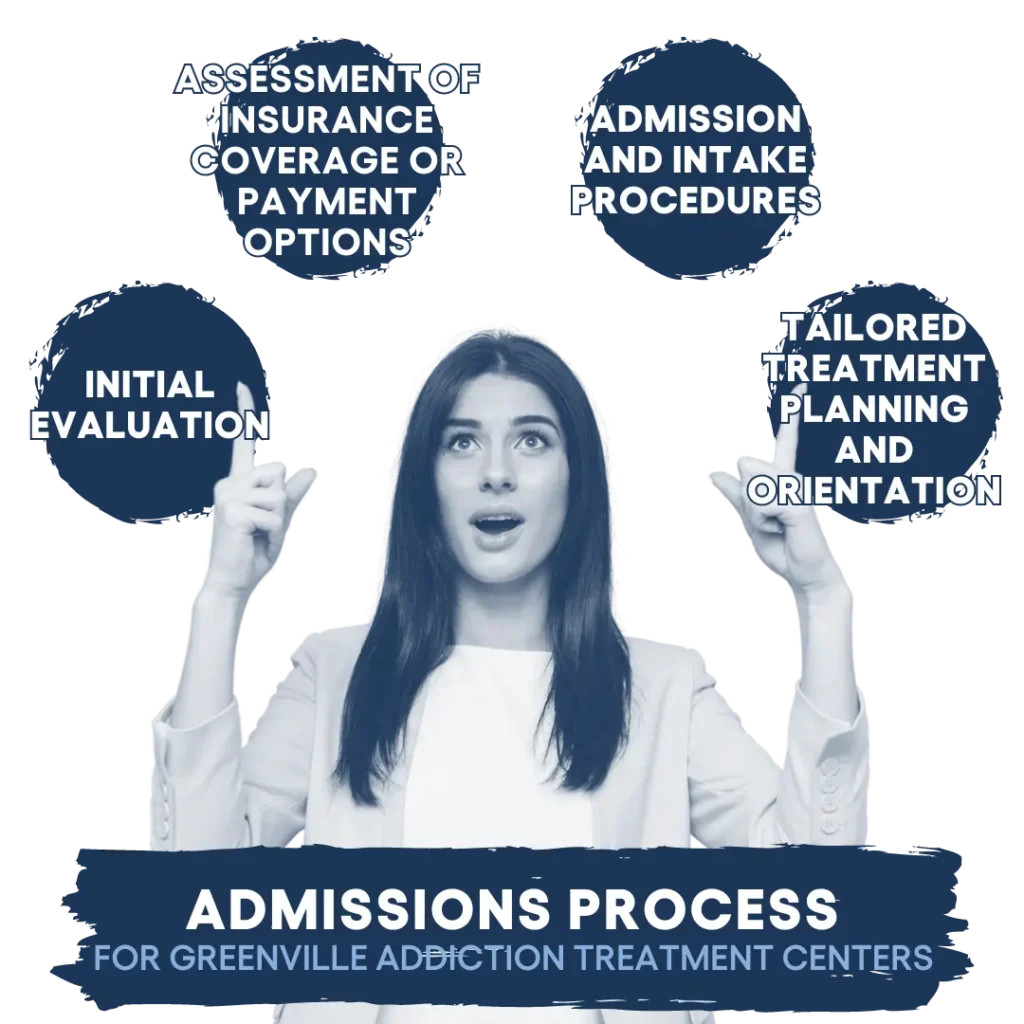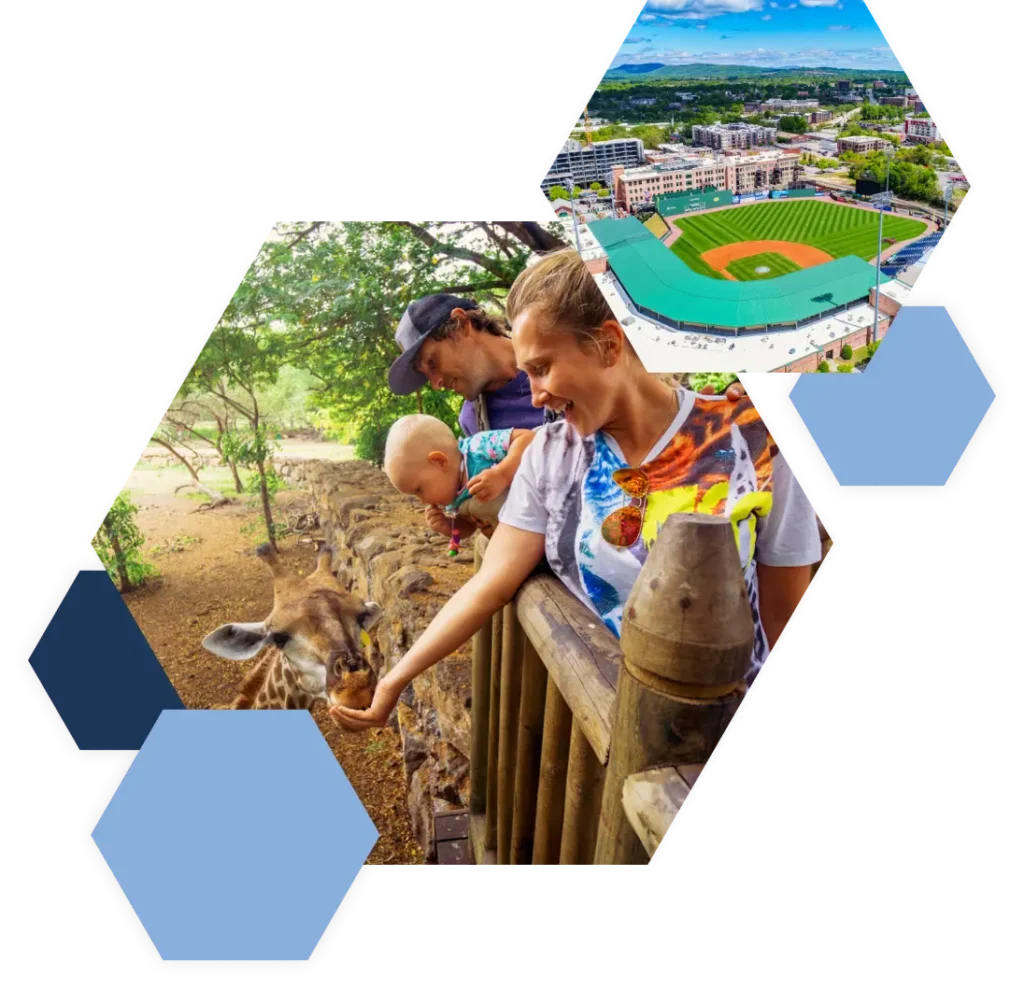If you are in the Greenville, SC, area and need help with drug and alcohol addiction – call (704) 248-8561.

Greenville, South Carolina, is best known as the crossroads where nature, culture, and southern hospitality unite – an inviting place where the landscape complements the down-to-earth communities it surrounds. Even in this tranquil city, Greenville residents struggle with addiction and mental health disorders, ranging in type and severity, including mental health disorders and drug and alcohol addiction.
Greenville addiction treatment centers offer a range of substance abuse treatment options catering to individual needs. When beginning a program for addiction treatment in Greenville, SC, you will find teams who offer guidance, promote community-based support, and so much more – aiding you in the sobriety journey.

When selecting an addiction treatment center in Greenville, SC, it's crucial to consider several factors to ensure you or your loved one receive comprehensive and effective care. Here are 10 things to look for:
Choose a facility that is accredited by reputable organizations such as the Joint Commission or the Commission on Accreditation of Rehabilitation Facilities (CARF). Accreditation indicates that the facility meets high standards of quality and safety in addiction treatment.
Evaluate the types of treatment approaches offered by the center. Look for evidence-based therapies such as cognitive-behavioral therapy (CBT), dialectical behavior therapy (DBT), motivational interviewing, and medication-assisted treatment (MAT). Ensure that the facility provides a personalized treatment plan tailored to your specific needs and preferences.
Verify that the treatment center employs licensed and experienced healthcare professionals, including addiction counselors, therapists, psychiatrists, nurses, and medical doctors. The staff should have expertise in treating substance use disorders and co-occurring mental health conditions.
If you have a co-occurring mental health disorder such as depression, anxiety, or PTSD, seek a treatment center that offers integrated treatment for dual diagnosis. Addressing both substance abuse and mental health issues concurrently can improve long-term recovery outcomes.
Choose a facility that provides a continuum of care, including detoxification services, residential or outpatient treatment, and aftercare planning. A comprehensive treatment program should support individuals through each stage of recovery and offer resources for relapse prevention and ongoing support.
Consider whether the treatment center involves family members in the recovery process through family therapy sessions, educational programs, or family support groups. Family involvement can strengthen relationships, improve communication, and provide essential support for the individual’s recovery journey.
Look for treatment centers that offer holistic and experiential therapies as complementary approaches to traditional counseling. These may include yoga, meditation, art therapy, equine therapy, and recreational activities. Holistic therapies can enhance overall well-being and address underlying emotional and spiritual needs.
Consider the location and amenities of the treatment center, taking into account factors such as proximity to home, accessibility for family visits, and the availability of comfortable accommodations. Facilities with serene environments and recreational facilities can contribute to a healing atmosphere.
Determine the cost of treatment and inquire about insurance coverage and payment options. Many addiction treatment centers accept health insurance plans, Medicaid, or offer sliding scale fees or financing options to make treatment more affordable.
Research the reputation of the treatment center by reading online reviews, testimonials from former clients, and third-party ratings. Positive feedback from individuals who have completed treatment can provide insights into the quality of care and the effectiveness of the program.

There are several resources available for anyone looking for mental health and addiction treatment in Greenville. These opportunities include support groups, counseling services, sober living facilities, vocational training, and legal assistance. Here are a few to get you started on the next step of your sobriety journey:
NAMI: South Carolina Mental Health Resource Guide – Full list of crisis and support services available in the upstate region.
Southeastern Recovery Center – Full service, holistic therapies for mental health, alcohol, and drug rehab in Greenville, SC.
SAMHSA National Helpline – National helpline for confidential, free help from public health agencies to find more information on local addiction and mental health resources.

Mental health and substance use disorders are at the forefront of public health concerns across the nation, and the same is true in South Carolina. From 2020 to 2021, South Carolina saw a 25% increase in overdose deaths – from 1,734 to 2,168. In 2021, fentanyl was involved in more than two-thirds of all opioid-involved overdose deaths.
Understanding state statistics on overdose and addiction can shed light on the impact it has on Greenville and its residents. These statistics have the potential to inform policy decisions, resource allocation, and community interventions aimed at addressing addiction issues.
A new, sober life awaits! The admissions process for a Greenville drug and alcohol rehabilitation center may vary based on the internal process of the facility, but in general, you can expect the following four steps:

The first phase for individuals seeking treatment involves an initial evaluation. This evaluation may start with a telephone conversation or an in-person meeting with an admissions counselor or intake coordinator. During this evaluation, individuals will discuss their substance use history, medical background, mental health concerns, and any past treatment experiences. The primary goal of this evaluation is to collect pertinent information and to determine the most suitable level of care and treatment for each individual.
Following the initial evaluation, the admissions team will aid individuals in assessing their insurance coverage or exploring alternative payment methods. They will collaborate with individuals to comprehend their financial circumstances and identify the optimal approach to cover treatment expenses. If individuals have insurance, the admissions team will work with the insurance provider to determine coverage for substance abuse treatment services.
Upon confirmation of insurance coverage or payment arrangements, individuals will progress through the admission and intake procedures. This process will require completing paperwork, written consent via forms, and providing essential personal details. The admissions team will also provide individuals with information regarding the treatment journey, including regulations, anticipated daily routines, and available supportive resources.
Following the completion of admission and intake procedures, individuals will work with a treatment team to craft a personalized treatment plan. This plan will outline the individual’s recovery objectives, along with the specific therapies and interventions designed to accomplish those goals. Individuals will also undergo an orientation to familiarize themselves with the rehab facility, including a guided tour of the premises and introductions to staff members and fellow clients.
AA (Alcoholics Anonymous) and NA (Narcotics Anonymous) meetings are support groups for individuals struggling with alcohol and drug addiction in Greenville. These meetings provide a safe and confidential space where individuals can share their experiences, struggles, and triumphs with others who understand firsthand the challenges of addiction.
To find local meetings, call 800-681-2956 – or check out a list below to get started.
To find local meetings (in-person and virtual), click here – or check out the list below.
Exploring sober-friendly activities and events in Greenville can make a difference on your sobriety journey. Engaging in outdoor activities, getting active, looking at art, and simply relaxing can promote social connections and enhance your overall well-being during the recovery process.
Here are some fun activities to do with your family in Greenville:

Finding a way to pay for addiction and mental health treatment can be overwhelming. Options are available to help you get sober – including insurance, payment options, government aid, and more. Here is more information on ways you can pay for mental health, alcohol, and drug rehab centers in Greenville, SC:

Many health insurance plans, including private insurance and Medicaid, provide coverage for addiction treatment services. Contact your insurance provider to understand your coverage options, including inpatient or outpatient rehab, detoxification, therapy sessions, and medications.

If you qualify for Medicaid, it may cover some or all of the costs associated with addiction treatment, including detox, counseling, and medication-assisted treatment. Medicaid eligibility criteria vary by state, so check with the South Carolina Department of Health and Human Services or visit healthcare.gov to determine your eligibility and coverage options.

South Carolina offers state-funded addiction treatment programs for individuals who may not have insurance or who need financial assistance. These programs may provide low-cost or free services, including detox, residential treatment, outpatient counseling, and support groups. Contact local community health centers or the South Carolina Department of Alcohol and Other Drug Abuse Services (DAODAS) for more information.

Some rehab facilities in Greenville offer sliding scale fees based on income and ability to pay. This means that the cost of treatment is adjusted according to your financial situation, making it more affordable for individuals with limited resources. Inquire about sliding scale fees when researching treatment centers.

Many rehab facilities offer payment plans or financing options to help individuals cover the cost of treatment. You may be able to arrange a monthly payment schedule or secure a loan to finance your rehab expenses. Speak with the admissions staff at the treatment center to discuss payment options and find a solution that works for you.

If you have an Employee Assistance Program through your employer, it may offer benefits for addiction treatment, including counseling sessions, referrals to rehab facilities, and financial assistance. Contact your human resources department or EAP provider to inquire about available resources.

Some nonprofit organizations and foundations offer grants or scholarships to individuals in need of addiction treatment. These funds may cover some or all of the costs of rehab, depending on eligibility criteria and available funding. Research local charities, nonprofit organizations, or national foundations that support addiction recovery initiatives.

Consider reaching out to friends, family members, or community members for financial support through crowdfunding platforms or fundraising events. Sharing your story and explaining the importance of addiction treatment can inspire others to contribute to your recovery journey.
Greenville offers a range of addiction treatment programs, including inpatient rehabilitation, outpatient treatment, detoxification services, medication-assisted treatment, and holistic therapies.
Many addiction treatment centers in Greenville are accredited by organizations such as the Joint Commission or the Commission on Accreditation of Rehabilitation Facilities (CARF), ensuring high standards of quality and safety in treatment.
Yes, many treatment centers in Greenville provide integrated treatment for co-occurring mental health disorders alongside addiction, addressing both issues simultaneously for comprehensive care.
Addiction treatment programs in Greenville may incorporate various evidence-based therapies such as cognitive-behavioral therapy (CBT), dialectical behavior therapy (DBT), motivational interviewing, family therapy, and experiential therapies like art therapy or yoga.
Many treatment centers in Greenville accept health insurance plans, including private insurance and Medicaid. It's essential to verify coverage with your insurance provider and the treatment center before starting treatment.
